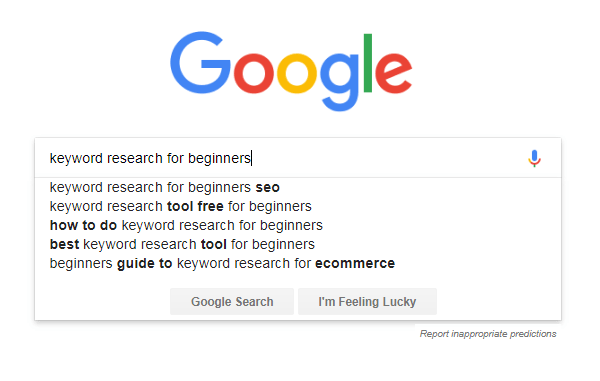Keyword research is one of the most important skills that any affiliate marketer, especially beginners, should master.
Without proper research and use of keywords, you will have great trouble bringing people to read your content and if no people read your content, you won’t be making any money.
This beginner’s how-to guide on keyword research will let you know everything about finding and using the right keywords to bring your articles closer and closer to the first page results of the search engines, maximizing your traffic and earnings.
Everything you learn right in this lesson must be constantly applied by you on every single article that you will be composing from now on.
This is lesson #7 of my affiliate marketing course for beginners.
If for any reason you have not yet gone through all the previous lessons, please do, before going any further.
You may find the links right below:
- What is Affiliate Marketing and How It Works. (Lesson #1)
- What is a Niche Marketing Strategy? Finding Your Niche! (Lesson #2)
- Create Your Own Business Website for Free, in Less Than 2 Minutes (Lesson #3)
- How to Set Up a WordPress Website for Beginners (Settings, Plugins, etc)… (Lesson #4)
- Creating Initial Website Content… The Foundation of Your Success! (Lesson #5)
- Fully Customize Your New WordPress Website in a Few Simple Steps! (Lesson #6)
What are Keywords?
A keyword is simply a word or phrase that people search for in search engines in order to find articles containing information on a specific subject.
Every time you are conducting a Google search you are basically typing a keyword into the search box and then Google displays web pages that are relevant to this specific keyword.
For example, if you want to find out info on germinating a lemon seed you will most probably search for the keyword “how to germinate a lemon seed”.
Then Google is going to display articles which contain information on how to germinate a lemon seed.
What is the Importance of Keywords?
Keywords are instrumental in your online business and the root of all your success as an affiliate marketer as they are the starting point of all of your Google rankings and traffic.
Google has ways to understand what an article of yours is about and display it as a result when specific keyword queries are made.
The only job of Google is to help people find information relevant to the keyword they searched for.
By creating an article around a specific keyword, you help Google understand what this article is about. Google then ranks your article for your target keyword and displays it as a result when anyone searches for it(the keyword).
Moreover, by going for specific keywords you gain the power to determine the kind of people who will be reading your articles.
This way, you are able to easily predict
- What problems your readers are facing
- The kind of information they are looking for
- How to help them solve their problems better and faster
- The products that you should recommend them
- How much money they are willing to spend
- etc
Lastly, by using low competition keywords, usually called “Low Hanging Fruit” or “Long Tail” keywords you can get your articles to get ranked closer to the first page of the search results, thus gaining more visitors and subsequently increasing your earnings.
We are going to talk about those keywords later on.
Each Post You Create Must be Targeting a Specific Keyword
Basically, every single word in an article is a keyword.
However, the keywords that you should be targeting in your articles are those which other people are going to be searching for in the search engines in order to find articles containing information relevant to those keywords.
For example, “keyword research for beginners” is a keyword that this post is ranked for. This means that when someone types in the Google search box the term “keyword research for beginners”, this article will be displayed in the results.
This happens because I have actually optimized this article myself in such a way that it would show up in the SERPs(Search Engine Results Pages) when someone searches for this specific term.
Each post you publish on your website should target a specific keyword.
Then as you keep building content targeting various keywords, you are going to start getting ranked for all of them which will lead to increased traffic and ultimately increased revenue.
However, not all keywords are viable for use. Some might not get enough searches per month while others might be way out of your league in terms of competition.
This is why you need a keyword research tool.
What is a Keyword Research Tool?
A keywords research tool basically lets you find out the
- Average searches a keyword gets per month
- Visits your article which has been ranked on the first page of Google for a keyword will be receiving
- The number of articles which have been ranked for this keyword in Google(competition)
Based on those metrics, you will be able to determine if a keyword is viable for use or not.
There exist a ton of free as well as paid keyword research tools online. The one that I have been using since day one is called Jaaxy.
Jaaxy is included in both free and premium Wealthy Affiliate memberships.
As a free Wealthy Affiliate member, you can use a limited version of Jaaxy just for 30 keyword searches.
As a premium Wealthy Affiliate member, you not only get to use Jaaxy for UNLIMITED keyword searches, but you get access to all of its features. These include SiteRank scans, search analysis, affiliate program search, the Alphabet Soup tool, and much more.
If you have not yet created a Wealthy Affiliate free account, it is important that you create one right now because in a while you will have to start using the Jaaxy keyword research tool.
Jaaxy is located under the tab “Research” on the left sidebar inside the Wealthy Affiliate platform.
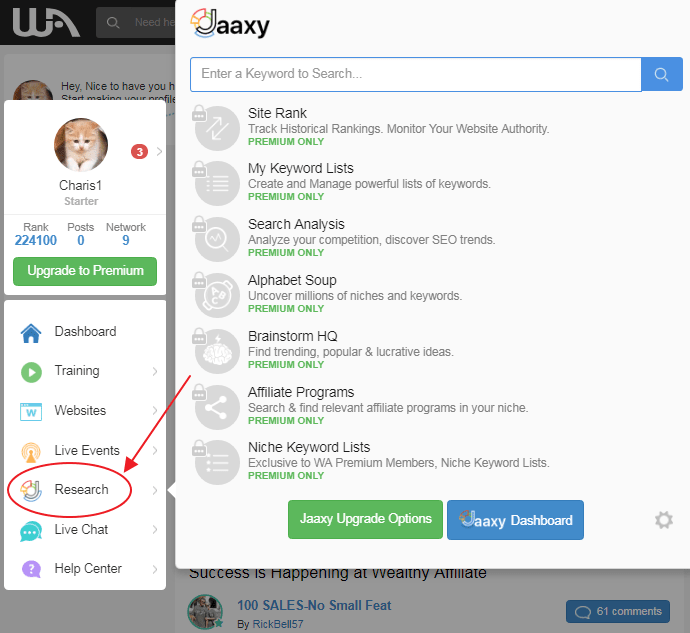
As soon as you locate it, go ahead and type the phrase “women’s shoes”(without the quotation marks) inside the search box.
Hit enter and you will come across a screen like this below.
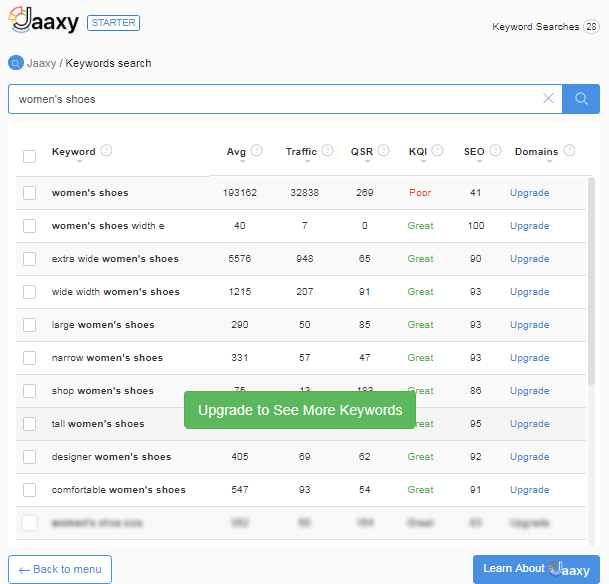
On the far left column, under the tab “Keyword” you can see the keyword “women’s shoes” we just searched for as well as some relevant keywords below it.
The “Avg” column displays the average searches that each keyword receives per month.
“Traffic” refers to the visits an article will receive if it gets ranked on the first page of Google for a given keyword.
“QSR” or “Quoted Search Results” is the number of articles which are ranked in Google for any given keyword, or in other words, your competition.
The “KQI”, “SEO”, and “Domains” tabs are not that important and should not concern you right now.
The only tabs that you need to pay attention to are the “Keyword”, “Avg”, and “QSR” tabs.
If you are still a free Wealthy Affiliate member, be careful to not start searching for any other keywords just yet as you only have 30 searches and it is very important not to waste them until you understand what are Low Hanging Fruit/Long Tail keywords.
You can see your remaining searches on the top right corner of the tool. In my case, I have 28 to go.
What is a Low Hanging Fruit/Long Tail Keyword?
In order to start getting traffic, targeting just any keyword is not enough… You have to start writing content around keywords that will bring your articles the closest to the first page of the search results.
This is where the “Low Hanging Fruit” or “Long Tail” keywords come into play.
Essentially a low hanging fruit is a fruit that is typically hanging on the lowest branches of a tree.
It is also smaller, and fewer people will be competing to get it, as most of them will be aiming for the big shiny fruit at the top of the tree.
Essentially, a low hanging fruit keyword is a keyword which
- gets less traffic
- has low competition
Such keywords are also called “Long Tail” as they are usually longer and more targeted phrases.
For example, the keyword “shoes” is not a long tail keyword but the term “cheap running shoes for women” is.
The idea behind this approach is to get your articles to rank easier and faster as close to the first page of the search engines as possible.
Most of the time, a brand new website is difficult if not impossible to get ranked under competitive, high-traffic terms and this is why, as a beginner, you will be much better off going for the low hanging fruit.
Using the low hanging fruit technique is your path to getting Google to rank your articles in high positions as a beginner.
Nevertheless, this strategy can be used FOREVER, even from the most experienced marketers, leading to unlimited amounts of traffic.
Of course, there are other optimizations that have to take place to maximize your rankings such as optimizing the size of your images, your website’s loading speed, creating internal links, etc.
However, using low hanging fruit keywords to compose your articles around is where the magic starts to happen.
How to Find Low Hanging Fruit/Long Tail Keywords
Long Tail keywords have certain characteristics such as
- they are way more specific and targeted
- they are usually composed of more than 2 words(thus the long tail term)
- fewer people are searching for them per month
- they are much less competitive(less QSR)
For example, as you can see in the image below, the keyword “shoes” is a very vague term, it has extremely high search volumes(761768 searches per month), and a very high competition(242 articles).
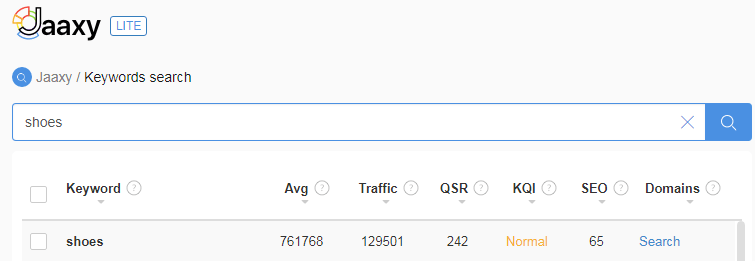
This keyword is definitely not a long tail one and as a beginner, you will never get an article ranked for it.
Colossal websites like Amazon, Adidas, Nike, Target, etc are ranking for this keyword and you will definitely get stamped out by them.
A better option would be to target a more specific kind of shoes such as running shoes.
As you can see in the image below, the term “running shoes”, still has high search volumes(36351 searches per month), but way less competition(129 articles).
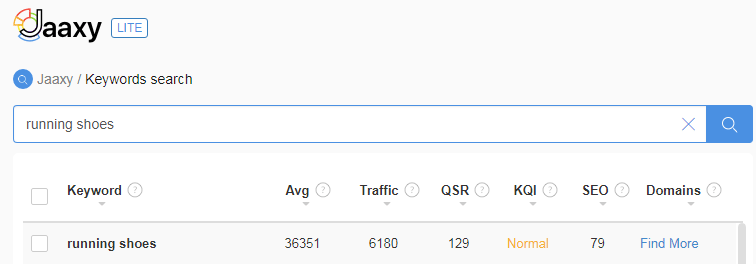
However, for a brand new website, I would not recommend this keyword either as its competition is still relatively high.
Let’s keep narrowing it down.
The term “running shoes for women” is a pretty awesome term for beginners to use as it has 5968 monthly searches and just 72 competing articles.
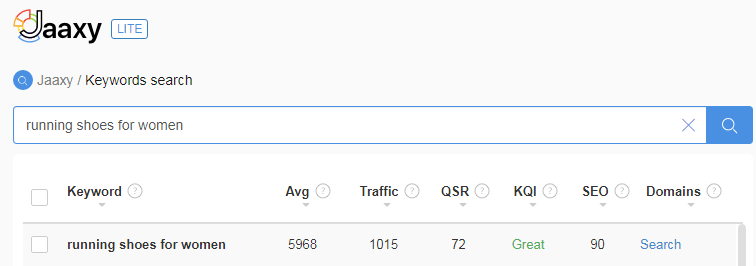
However, to further increase my chances of getting my article ranked on the first pages of Google, I would narrow it down even further to something like “cheap running shoes for women”.
As you can see below, the keyword “cheap running shoes for women” gets 146 searches per month and has only 34 articles competing for rankings.
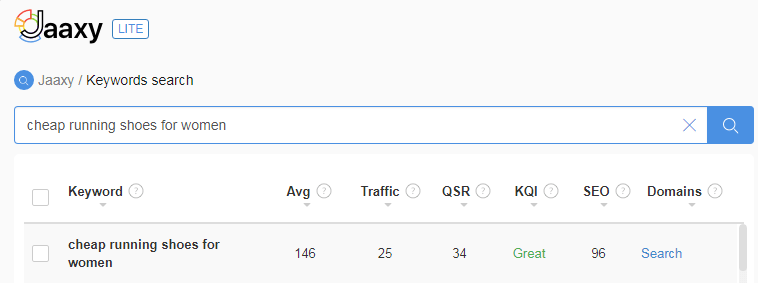
This keyword is absolutely awesome for beginners in the shoe niche. This is definitely what I would go for.
Many people would ask:
-Why not target the term “running shoes for women” which gets 5968 searches per month and target the “cheap running shoes for women” one which gets merely 146 searches per month?
The answer would be that it is way better to get ranked on the 1st page of Google for a keyword which gets 150 searches a month than getting ranked on the 8th page for one which gets 5000 searches a month.
The reason?
How many times have you gone past the 2nd or 3rd page of the Google search results yourself?
I have never and most people are like that as well.
The closer your articles are on the first page results of Google, the more traffic(visitors) they will get and more visitors=more money for you.
Task: Come up With as Many Low Hanging Keywords as You Can
Now that you know all about the low hanging fruit keywords, it’s time to start coming up with some. There exist thousands of them for any given niche so if you can’t come up with any, well, try harder.
A very efficient way to come up with infinite low hanging fruit keywords is by using the alphabet soup technique.
As soon as you come up with at least 20 of them, you will start using Jaaxy to get their stats.
For a keyword to be considered low hanging and viable for use it must
- Get some traffic, ideally over 30 searches per month
- Have less than 100 QSR(competition)… The less competition the better.
- Be relevant to your niche
- Make sense(If the keyword can’t be used in a proper sentence, then you shouldn’t use it. Go for grammatically correct phrases)
For example, using the alphabet soup technique along with Jaaxy, I managed to find those 5 long tail keywords on the lemon tree advice niche below, right of the bat.
- potted lemon tree fertilizer(40 searches per month, 17 QSR)
- how to grow a lemon tree in a pot(107 searches per month, 37QSR)
- how to prune a lemon tree(257 searches per month, 29 QSR)
- lemon tree pots(88 searches per month, 20 QSR)
- how to replant a lemon tree(40 searches per month, 2 QSR)
So now that you have come up with some viable, long tail keywords for your own niche you have to start building content around them.
Moving forward you are going to be creating all of your posts based on long tail keywords. Each page or post on your website will be targeting a different long tail keyword and through time this will lead to incredible amounts of traffic and revenue.
How to Use Your Keywords the Right Way
In order to make Google aware of the focus keyword of any given post of yours, there are a few simple steps that you should be following.
- Use your keyword in the title of your article
- Include the keyword somewhere in the first couple of paragraphs of your article
- Keep stating the keyword throughout your article but only when appropriate. Don’t force or stuff it.
- If possible, include the keyword in the last paragraph of your article
Make sure your content is helpful, informative, and human-friendly. Always remember that you are not writing for Google but for actual people who are going to read your content.
If you focus only on keywords, and your content sucks, no one is going to read it, share it, or come back for more articles of yours.
To counter that, go ahead and take a look at my 12 Awesome Tips to Writing Killer Website Content as a Beginner.
Some Important Tips on Keyword Usage for Beginners
- Don’t stuff your articles with keywords(Google does not like keyword stuffing. Having more keywords or more of the same keyword in your article won’t make it rank better. On the contrary, it might even drop its ranking. Google wants content addressed to helping people and not content that attempts to trick or outsmart it. Google can see through such attempts.)
- Use keywords that make sense to other people as well as grammatically(the term “making money online beginners” might be a low hanging fruit but is unacceptable to be used as a focus keyword as it is not grammatically correct. The keyword “how to make money online for beginners” might have more competition but it would be preferable as it is a grammatically correct phrase)
- Focus only on one keyword per article(finding 10 keywords and using them all in just one article is going to confuse both the search engines as well as the people who are going to be reading your article… Also, this is considered keyword stuffing, which as said earlier, Google hates).
- Include your keyword in your title as well as in the first and last paragraphs
- Mention your keyword only when appropriately
- It is best practice to create your article’s title around your keyword(we are going to talk about creating capturing headlines in a forthcoming article)
- Include your keyword in some of your headings(again only when appropriate… do not force your keywords in your content as this is considered keyword stuffing as well)
An Overview on How I Conduct my Keyword Research
- I think about a subject that is relevant to my niche
- This subject should be something that would help my readers in some way or something that my readers would like to know about
- I try to be as specific as I can. For example, instead of targeting the word “keywords” in this article, which is basically its general subject, I targeted the term “a guide to keyword research for beginners” which is way more specific
- I then check for the average searches per month this keyword gets, as well as its competition
- If it has over 20 searches per month and less than 100 QSR, I am good to go
- Before I start creating my content, I Google the keyword myself to find out about the headlines my competition is using to rank for this keyword, as well as to gather some initial information on the subject which will help my creative juices flowing
- Then I start writing my content
- I am using the target keyword in my headline, as well as the first paragraph of my content
- I don’t attempt to use my keyword throughout my article. I just write helpful, informative content which will help my readers
- I link to other useful articles of mine, relevant recommended products, or even better a product review that I have written
- I publish the article
- Repeat
Conclusion
Once again, keywords are the key to getting visitors to your articles and thus making any kind of profit.
In order to become a successful affiliate marketer, searching for and using low hanging fruit keywords must become second nature to you.
Below I will link to some training resources which will help you achieve that.
- Keywords, The Start of Your Content
- The Low Hanging Fruit
- Understanding Keywords & A Day of Selling
- Creating Reviews and Using Targeted Keywords
- The Keyword Research Process
- Low Hanging Fruit Case Study(Webinar)
Take your time and understand each of those lessons fully before moving to the next one. Don’t rush through your training. Mastering your keyword research skills is one of the most vital investments in yourself as well as in your online business that will definitely pay off big time.
If you have any questions or need any further help or guidance from me, I encourage you to leave a comment below or email me at harry@dearboss-iquit.com.
You could also contact me through a PM on my Wealthy Affiliate Profile.
Whatever the case, I will get back to you as soon as possible.
My best regards to you,
Harry,
dearboss-iquit.com
